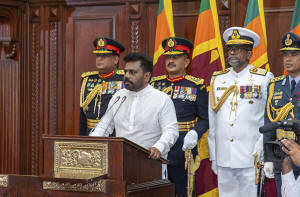Marxist Anura Kumara Dissanayake sworn in as Sri Lanka's president
 Send a link to a friend
Send a link to a friend
 [September 23, 2024]
By KRISHAN FRANCIS and BHARATHA MALLAWARACHI [September 23, 2024]
By KRISHAN FRANCIS and BHARATHA MALLAWARACHI
COLOMBO, Sri Lanka (AP) — Marxist politician Anura Kumara Dissanayake
was sworn in as Sri Lanka's president on Monday after an election that
saw voters reject an old guard accused of leading the country into
economic crisis.
Dissanayake, 55, who ran as head of the Marxist-leaning National
People's Power coalition, defeated President Ranil Wickremesinghe,
opposition leader Sajith Premadasa and 35 other candidates in Saturday's
election.
The election came as the country seeks to recover from a severe economic
crisis that led to shortages of essentials such as foods, medicines,
cooking gas and fuel in 2022, triggering massive protests that forced
then-President Gotabaya Rajapaksa to flee the country and resign.
In a brief speech after the swearing-in, Dissanayake pledged to work
with others to take on the country's challenges.
“We have deeply understood that we are going to get a challenging
country," Dissanayake said. “We don’t believe that a government, a
single party or an individual would be able to resolve this deep crisis.
He’s the ninth person to hold Sri Lanka’s powerful executive presidency,
created in 1978 when a new constitution expanded the office’s powers.
However, Dayan Jayatilleka, a former diplomat and political analyst said
Dissanayake could face challenges as the first president to enter office
without a majority of the vote.

“It’s not an insurmountable obstacle,” said Jayatilleke, but said he
will have to “engage as much as possible in politics of consensus.”
Dissanayake's coalition is led by the Janatha Vimukthi Peramuna, or
People’s Liberation Front, a Marxist party that waged two unsuccessful
armed insurrections in the 1970s and 1980s to capture power through
socialist revolution. After its defeat, the JVP entered democratic
politics in 1994 and has been mostly in opposition since then. However,
they have supported several previous presidents and been part of
governments briefly.
[to top of second column]
|

Commanders of the security forces stand behind as Sri Lanka's new
president Anura Kumara Dissanayake, addresses a gathering after he
was sworn in at the Sri Lankan President's Office in Colombo, Sri
Lanka, Monday, Sept.23, 2024. (Sri Lankan President's Office via AP)

The NPP also includes groups representing academics, civil society
movements, artists, lawyers and students.
Just before the swearing in, Prime Minister Dinesh Gunawardena
resigned, clearing the way for the new president to appoint a prime
minister and a cabinet.
Chinese president Xi Jinping congratulated Dissanayake on his
victory, saying on Monday that China looks forward to working
together “to jointly carry forward our traditional friendship.” The
U.S. and India previously congratulated Dissanayake.
Dissanayake was first elected to Parliament in 2000 and briefly held
the portfolio of agriculture and irrigation minister under President
Chandrika Kumaratunga. He ran for president for the first time in
2019 and lost to Rajapaksa.
Dissanayake's first major challenge will be to act on his campaign
promise to ease the crushing austerity measures imposed by his
predecessor Wickremesinghe under a relief agreement with the
International Monetary Fund.
Wickremesinghe has warned that any move to alter the basics of the
agreement could delay the release of a fourth tranche of nearly $3
billion.
That economic crisis resulted from excessive borrowing to fund
projects that did not generate revenue, the impact of the COVID-19
pandemic, and the government’s insistence on using scarce foreign
reserves to prop up its currency, the rupee.
Dissanayake has also vowed to dissolve parliament, where his party
holds only three of 225 seats.
All contents © copyright 2024 Associated Press. All rights reserved |